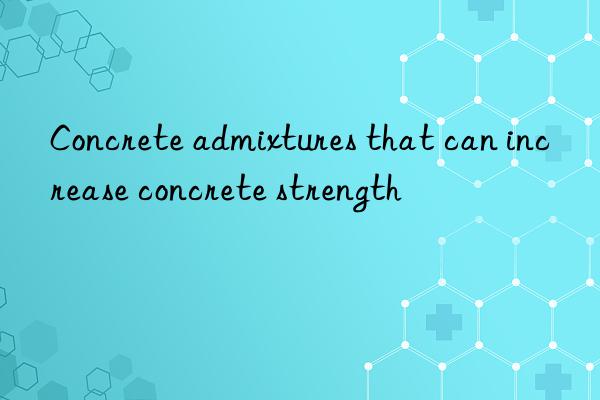
Concrete admixtures refer to substances added during the concrete mixing process that can significantly improve the properties of concrete. The dosage is generally no more than 5% of the cement mass. Due to the improvement of the properties of concrete by admixtures, an increasing proportion of them are used in engineering. In many countries, the use of concrete mixed with admixtures accounts for 60% to 90% of the total amount of concrete. Therefore, admixtures have gradually become the largest proportion of concrete. The fifth ingredient.
1. Classification of admixtures
There are many types of concrete admixtures. According to the "Classification, Naming and Definition of Concrete Admixtures", concrete admixtures are divided into four categories according to their main functions:
1. Admixtures to improve workability: water-reducing properties, pumping agents, air-entraining agents
2. Admixtures to adjust setting and hardening time: retarder, early strength agent, accelerating setting agent
3. Admixtures to improve durability: rust inhibitors, waterproofing agents, air-entraining agents
4. Admixtures that improve other properties: air-entraining agents, colorants, Expanding agent, antifreeze
2. Water reducing agent
Water-reducing admixture refers to the addition of admixtures that can significantly reduce the amount of mixing water under the condition that the concrete slump is basically the same.
(一 ) Mechanism of action of water reducing agent
Water reducing agent is a surface-active substance whose molecule is composed of a hydrophilic group and a hydrophobic group. When cement is mixed with water, the cement slurry forms a flocculation structure, wrapping part of the mixing water and reducing fluidity. The action mechanism of water reducing agent is shown in the following three aspects:
(1) The hydrophobic group is directionally adsorbed on the surface of the cement particles, and the hydrophilic group points to the aqueous solution, so that the surface of the cement particles has the same charge. The repulsive force separates the cement particles and releases flocculation. Structure free water and increase fluidity;
(2) The hydrophilic group absorbs a large number of polar water molecules, increases the thickness of the solvated water film on the surface of cement particles, acts as a lubrication, and improves workability;
(3) Water reducing agent reduces surface tension, making cement particles easier to wet. Make hydration relatively sufficient, thereby improving the strength of concrete.
Fig. Schematic diagram of flocculation structure and water reducing agent effect
(2) Technical and economic effects of water reducing agent
1. Increase liquidity. When the water consumption and water-cement ratio remain unchanged, the concrete slump can increase by 100 to 200mm without affecting the strength of the concrete.
2. Improve the strength of concrete. Under the condition of keeping the fluidity and cement dosage unchanged, the mixing water consumption can be reduced by 10% to 15%, thereby reducing the water-cement ratio and increasing the concrete strength by 15% to 20%.
3. Save cement. Under the condition of keeping fluidity and water-cement ratio unchanged, it can be reducedWorkability of concrete mixtures
2. Significantly improve the impermeability and frost resistance of concrete
3. Reduce the strength of concrete. Generally, when the air content of concrete increases by 1%, its compressive strength will decrease by 4% to 6%, and its flexural strength will decrease by 2% to 3%.
Entraining air The agent can be used for impermeable concrete, anti-freeze concrete, anti-sulfate corrosion concrete, severe bleeding concrete, lean concrete, light concrete, and concrete with requirements for finishes, etc. However, the air-entraining agent should not be used for steam-cured concrete and Prestressed Concrete.
6. Antifreeze
Antifreeze is an admixture that can harden concrete at negative temperatures and achieve expected performance under specified curing conditions. Commonly used antifreezes include chlorine salts, chlorine salt rust inhibitors, and physical chlorine salts.
Antifreeze Concrete used for construction under negative temperature conditions. At present, domestic antifreeze varieties are suitable for temperatures between 0 and -15°C. When construction is performed at lower temperatures, other concrete winter construction measures should be added.
7. Accelerating setting agent
Accelerated setting admixture refers to an admixture that can quickly set and harden concrete. Accelerators mainly include inorganic salts and organic substances. The commonly used accelerating setting agents in my country are inorganic salts, mainly including Red Star I type, 711 type, 728 type, 8604 type, etc.
Quick setting After the agent is mixed into concrete, it can make the concrete initially set within 5 minutes, and the strength can be generated in 1 hour. The strength is increased by 2 to 3 times in 1 day, but the strength will decrease in the later period. The strength in 28 days is about 80% to 90% of that without mixing. The mechanism of rapid setting and early strengthening of the accelerator is to turn the gypsum in the cement into Na2SO4 and lose its retarding effect, thereby promoting the rapid hydration of C3A and precipitating its hydration product crystals in the solution, causing the cement slurry to solidify rapidly. Accelerated setting agents are mainly used in shotcrete or shotcrete projects in mine tunnels, railway tunnels, drinking water culverts, underground projects and shotcrete anchor support. </p

 微信扫一扫打赏
微信扫一扫打赏

